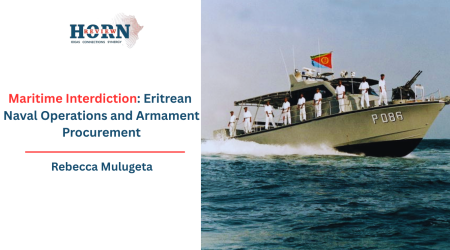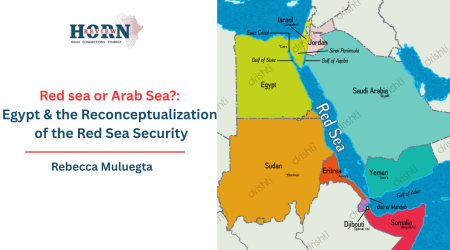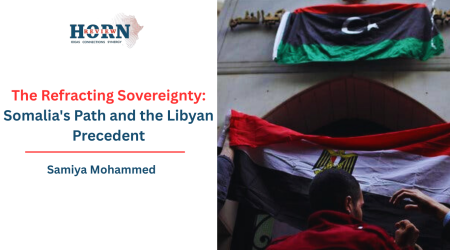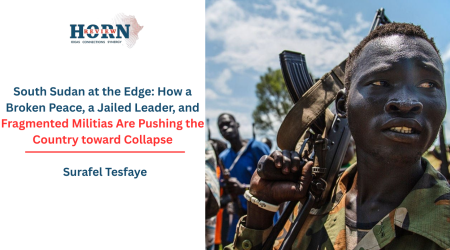
7
Aug
A War to the Shores: The Threats of Port Politics in the Horn of Africa
A Regional-Level Analysis
In the Horn of Africa, Djibouti and Eritrea are small states both in terms of capabilities and influence, as well as other parameters such as population size, geography, Gross National Product (GNP), Gross Domestic Product (GDP), and national power. Yet these small states become influential by using port wars as a means to remain visible in the regional power politics. Both Djibouti and Eritrea have been using their geographically granted sea coast as a tool to coerce the most populous and heavyweight state in the region: Ethiopia. Historically, these small countries were part of Ethiopia, albeit controversially, and they seceded from Ethiopia by following the disputed colonial border demarcation.
Among the various mechanisms that these small states use to exert their influence, we see them setting up unattainable rules, such as expensive port service fees, projecting decision-making power in the internal politics of their neighboring country in return for the use of port service. For instance, one of the main causes of the Ethiopian-Eritrean war (1998-2000), Meles Zenawi stated, was the decision of Ethiopia to change its currency that both Ethiopia and Eritrea were commonly using. Moreover, these countries try to maintain their strategic advantage by unlawful means. The Memorandum of Understanding (MoU) signed between Ethiopia and Somaliland in 2024 caused a huge uproar in Somalia (for other reasons) and increased unnecessary tension between Djibouti and Ethiopia. Yet while Ethiopia has a legitimate right to diversify its sea access, the Djiboutians must have taken the right direction in developing other economic sources than pursuing a port war.
The main reason for choosing port war over diplomacy is the lack of competitive port services in the Horn of Africa. Although Eritrea, Somaliland, Djibouti, and mainland Somalia can establish modern ports and compete with each other to offer their port service, the situation turned out to be that only Djibouti’s port is an active one in the region. Political instability, poor governance, and civil wars over border disputes are some of the reasons that hinder economic growth in the region. The demand for accessing the port of Djibouti becomes extremely high over time, and those politicians in Djibouti have understood this well and exploit it to gain social, economic, and political domination over Ethiopia and weaken those who have the potential to own their port. In short, the competition in regional power politics boils down to pursuing an economic interest by undermining their neighbors’ political sovereignty. And Djibouti does not want to lose its position as the sole provider of port service. Put differently, it is an estimated annual cost of three billion dollars, which Djibouti risks if Ethiopia stops using Djibouti’s port. Thus, Djibouti works day and night to maintain its sole ownership of port service in the Horn of Africa. Instead of trying to diversify its economy, Djibouti becomes disappointed whenever Ethiopia eyes alternative routes to secure its need for accessing the sea. Yet, Djibouti did not stop skyrocketing port service fees on Ethiopian goods going in and out, and failed to provide efficient service, which led the current administration to question the future of the bilateral economic cooperation with Djibouti. Under normal circumstances, the reciprocal exchange of goods and services is a normal opportunity to establish economic integration between countries, yet this opportunity should not be used to hurt one another.
Worse than Djibouti is the case of Eritrea, which might be a bit difficult to understand for an average person. Ethiopia’s economy has largely suffered and been limited by the loss of ports in Eritrea. More so, from the lack of will on Eritrea’s part to utilize the active ports. Economic dependency on its neighbors’ whims to get sea access is hurting Ethiopia’s economy to a large extent. Ethiopia lost two ports in Eritrea in the 1990s when Eritrea departed from Ethiopia. In the civilized world, this should not have been a problem, since what you need from others is a means to engage in market interaction. In this regard, Eritrea’s independence, which left Ethiopia landlocked, should have been a key reason for economic cooperation and integration. Ethiopia needs port or sea access through Eritrea, and the former has to pay a service fee. Ethiopia will not be happy about paying for the service. But let’s not forget that the survival of more than 4 million Eritreans is not Ethiopia’s concern now, so it will be fine if Ethiopia pays for the port service fee that benefits both. Yet what if the departing country just blocks port usage? This is not a hypothetical question because Eritrea is doing exactly this: they do not feel like sharing their port. This non-civilian attitude, if not pathological, is the real problem right now. Eritrea seems to enjoy the suffering of the two nations instead of opening up its economy and working together with the world to flourish its economy. Eritrea does not care much about economic development, and its people enjoy the exercise of a pseudo-sovereign power, that is, a one-man show.
In sum, Djibouti’s port war would not be a long-term guarantee for Djibouti’s secure existence as a sovereign state, but rather has an alienating effect on its neighbors. Regarding Eritrea, the loss-loss relationship with its neighbors does not advance the interests of anyone. Both Djibouti and Eritrea are using “small state diplomacy” – a strategic approach to compete against the greater powers. While an international system rightly protects the safety of small states, it is unfair to see global powers competing to control strategic locations, ignoring the need for regional neighbors to work together for their peaceful coexistence and economic integration. Thus, no other region demands a stronger port war diplomacy, that is, the use of diplomatic efforts to manage or resolve tensions or potential conflicts arising from access to or control of ports, particularly in the context of geopolitical competition and strategic interests. The Horn of Africa needs astute diplomats, who are open to dialogue and compromise, rather than dictator leaders, to figure out a way forward amidst the changing political dynamics in the region and the global.
By Markos Haile Feseha (PHD), Researcher , Horn Review










